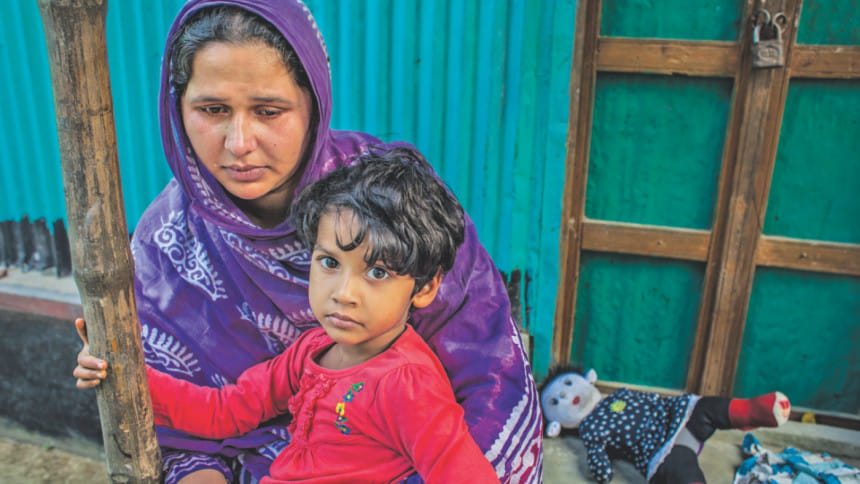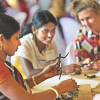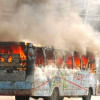I blame my fate

For 91 days from January 5 to April 5 last year, there was hardly a single day when innocent people were not burnt to death or injured in arson attacks on public transports. Some lost their loved ones, others their lone bread earners during the longest spell of horror allegedly carried out by the BNP-led coalition, protesting the January 5, 2014, elections.
At least 95 people were killed and about 1,500 injured. Most of them were ordinary citizens, living from hand to mouth. Another 45 got killed in "shootouts" with law enforcement agencies. About half of them were allegedly involved in arson attacks.
The economic loss from the blockade and shutdown was enormous.
One year on, the overall picture has changed but the ordeals of those injured and the families of those killed have not.
The Daily Star visited over a dozen such families. Today's story is based on another victim.
For Rita Begum, the loss is so heavy and painful that she tries not to remember it. Sometimes, she wishes if only she could forget it once and for all and move on. But she cannot.
Life has changed for the 27-year-old from Faridpur Sadar since she lost her father and husband in a petrol bomb attack during street violence last year. All she sees is uncertainty ahead.
"You've brought those memories back. I've been trying to bury those inside all these months," said the young mother, when The Daily Star went to talk to her at her home last month.
The thought of her loss numbs her, but the thought of raising her two kids all by herself sends a shudder down her spine. After the twin tragedy, Rita was promised a job of an attendant at Faridpur Medical College Hospital. The job never came.
"Everything is finished. If a woman lost her husband, she could go to her parents' house. But I've lost my father too. Where shall I go?" she said, sitting on the stairs of her rented house at Domrakandi village of Komorpur union.
"I get restless when I think about my kids and their future," she said as her four-year-old daughter Ila sat on her lap. Her elder daughter Iva, nine, is a class-four student.
It was February 7 last year. Rita's husband Ijayedul Islam, a truck driver, was going to Barisal with poultry feed. Her father Motaleb Sheikh and truck helper Munnu Mia were also in the truck. As the vehicle reached Mahilara in Barisal, arsonists hurled a petrol bomb, setting the truck on fire.
Ijayedul lost control and hit a roadside tree. On impact, the front part of the truck got smashed, trapping the three, as fire engulfed the whole truck. All three died on the spot.
Rita and Ijayedul married 12 years ago, and rented the house a few years back. Only months before his death, Ijayedul, a trucker for eight years, bought a piece of land nearby and started building their own house with their savings. The house remains half-built.
On assurance of protection from the police, Ijayedul had left home 14 days before he was killed. Ironically, he promised Rita that he would come home on February 7.
But it was not to be, thanks to a series of targeted arson attacks by suspected BNP-Jamaat blockaders. Between January 5 and April 5 last year, when the opposition alliance enforced almost a ceaseless blockade and hartal programme following government refusal to allow the BNP to hold a rally to protest the January 5 polls, at least 95 people lost their lives, 64 of them in firebomb attacks mainly on public transports. Some 1,500 were injured, many of them badly.
"He phoned me around 3:00am [February 7] and said he would come home by 12:00noon and have launch. That was the last time I spoke with him," Rita said.
On the evening of February 6, her father Motaleb went to her house, planning to go to Barisal with Ijayedul. Motaleb spent some time with his daughter, and around 1:00am went to Rajbari intersection where Ijayedul was waiting with the truck to take him.
Rita woke up at dawn feeling uneasy. She phoned her husband and her father, but found both the phones switched off. She then started doing household chores.
"I thought of cooking ruhi fish. There was one in the refrigerator ... and just then aunty [house owner] came screaming: 'Ijayedul is no more,'” she said, as her voice cracked.
For a few moments, she did not say anything. She then spoke again, abruptly: "Many like you [journalists] came and wrote. But nothing happened."
As for the kids, the younger one does not yet realise that she has lost her father.
"When anyone asks about her father, Ila says: “My father went to a faraway country. I don't know when he will come,'” Rita said.
Talking about the job offer, she said she started working at the hospital as an attendant following recommendation of a minister. The minister asked her to learn how to do the work, saying she would get the job in three to four months when there would be a circular.
"But I didn't get any pay in the last 10 months. Instead, I'm spending money every day on transport," she said, adding that she needed a job to meet the cost of education of her daughters.
A few months ago, some help came her way, however. She got Tk 10 lakh form the government, which she deposited with a bank and maintains the family with the monthly interest.
But who she thinks is responsible for all this?
"Who should I blame? It's my fate that I blame ... We don't do politics. My husband went out for earning a living for his wife and children ... To whom shall I seek justice? Can it bring back my husband? Never," she sighed, looking dejected and withdrawn.

 For all latest news, follow The Daily Star's Google News channel.
For all latest news, follow The Daily Star's Google News channel. 








Comments